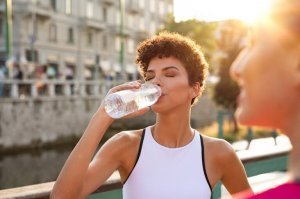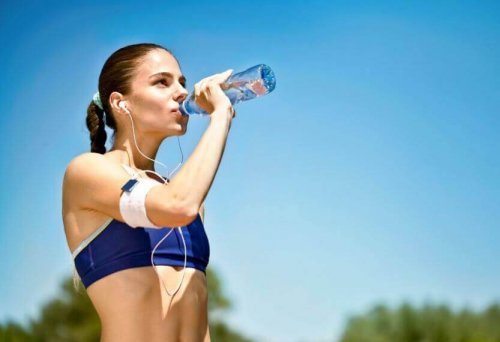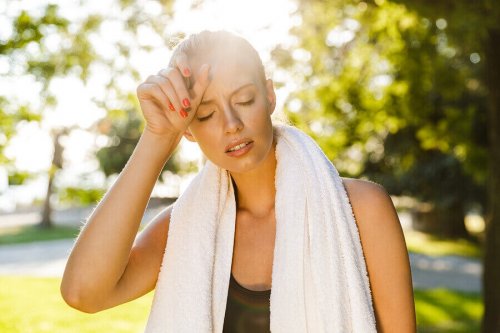Tips for Staying Hydrated While Walking in the Heat

One of the fundamental aspects of sports nutrition is proper hydration. When an individual is dehydrated by just one percent, it can reduce their sports performance by up to 12-15 percent. In the following article, learn about the importance of hydration and some tips for staying hydrated while on walks in hot weather.
You might like: 6 Signs of Dehydration
Hydration: tips for staying hydrated
In addition to decreased performance levels, you must keep in mind that losing lots of fluid from your body can lead to fatal health complications. This is even more true when it comes to exercising outdoors in hot and humid weather, where the amount of water lost through sweating is notably greater.
Additionally, the higher the intensity of the exercise, the greater the demand for fluids. The same is true of temperature and humidity: the body always tends to regulate its own temperature to keep it constant. In order to do this, a lot of water is necessary so appropriate fluid consumption is vital.
Therefore, it’s important not to substitute water consumption for sugary soft drinks, which could contribute to possible dehydration. In addition, the ingested liquids must always be fresh to avoid rapid gastric emptying.
Because of this, ensuring a correct replacement of water and electrolytes to prevent dehydration and muscle cramps is essential. In the following paragraphs, we’ll offer a series of tips to ensure proper hydration even in hot and humid climates.
Hydration on walks: before, during and after
Before exercising, it’s important to ensure proper fluid intake. You should consume at least one liter of water during the two hours leading up to your exercise. At this time, it may be a good idea to add some electrolytes – such as sodium – to the drink to prevent cramps or muscle pain once you’ve started exercising.
In addition, it’s also possible to include some water-soluble vitamins of group B, which are involved in energy production. It’s important that the water you’re drinking is slightly cool, as this increases the speed of gastric emptying and reduces the risk of upsetting your stomach.
Fluid consumption during the walk
Once you’ve started exercising, it’s recommended that you consume about 200 ml of water every 20-30 minutes. For this, it’s important that the drink contains electrolytes to prevent muscle problems. Getting an intake of minerals such as sodium or potassium is essential, especially if the temperature and humidity are high.
On the other hand, adding a source of glucose to your drink to prevent fatigue and loss of performance may be a good option. A 6 percent glucose drink is enough to keep the blood sugar curve stable and avoid stomach discomfort.
If for any reason an extra supply of glucose is needed, you may want to use energy gels. You can even drink some caffeinated energy gels, which can help delay the onset of fatigue.
Hydration once the walk is over
After the walking session is over, the most important thing to do is replace the lost water and nutrients. The recommended is to consume 150 percent of the water weight lost during the six hours following the walk.
The best option in this situation is cool water, without electrolytes or glucose. In addition, at this time it’s better to ingest your macro and micronutrients via solid foods that you’ll eat during your meals. Keep in mind that proper consumption of water post-exercise helps muscle and systemic recovery.
Warning symptoms
It’s important to take into account the different symptoms that may indicate that you’re dehydrated in the middle of the exercise. Dizziness, nausea, excessive exhaustion, and muscle cramps are all red flags that signal dehydration.
Additionally, it’s also important to stop exercising and replace the lost fluids and nutrients if this happens. Failure to do so increases your chance of suffering from heatstroke or dehydration. These conditions can be fatal.
Tips for staying hydrated on walks: conclusion
Hydration is one of the limiting factors in exercise practice. A fluid or electrolyte deficit can significantly reduce performance and have dire health consequences. For this reason, it’s important to ensure proper intake of liquids before, during, and after sports practice.
Combining water with drinks rich in electrolytes and glucose is usually a good option for different moments during a competition or workout routine. Some supplements, such as caffeine, can help delay the onset of fatigue, so you may also want to include it in drinks you consume.
One of the fundamental aspects of sports nutrition is proper hydration. When an individual is dehydrated by just one percent, it can reduce their sports performance by up to 12-15 percent. In the following article, learn about the importance of hydration and some tips for staying hydrated while on walks in hot weather.
You might like: 6 Signs of Dehydration
Hydration: tips for staying hydrated
In addition to decreased performance levels, you must keep in mind that losing lots of fluid from your body can lead to fatal health complications. This is even more true when it comes to exercising outdoors in hot and humid weather, where the amount of water lost through sweating is notably greater.
Additionally, the higher the intensity of the exercise, the greater the demand for fluids. The same is true of temperature and humidity: the body always tends to regulate its own temperature to keep it constant. In order to do this, a lot of water is necessary so appropriate fluid consumption is vital.
Therefore, it’s important not to substitute water consumption for sugary soft drinks, which could contribute to possible dehydration. In addition, the ingested liquids must always be fresh to avoid rapid gastric emptying.
Because of this, ensuring a correct replacement of water and electrolytes to prevent dehydration and muscle cramps is essential. In the following paragraphs, we’ll offer a series of tips to ensure proper hydration even in hot and humid climates.
Hydration on walks: before, during and after
Before exercising, it’s important to ensure proper fluid intake. You should consume at least one liter of water during the two hours leading up to your exercise. At this time, it may be a good idea to add some electrolytes – such as sodium – to the drink to prevent cramps or muscle pain once you’ve started exercising.
In addition, it’s also possible to include some water-soluble vitamins of group B, which are involved in energy production. It’s important that the water you’re drinking is slightly cool, as this increases the speed of gastric emptying and reduces the risk of upsetting your stomach.
Fluid consumption during the walk
Once you’ve started exercising, it’s recommended that you consume about 200 ml of water every 20-30 minutes. For this, it’s important that the drink contains electrolytes to prevent muscle problems. Getting an intake of minerals such as sodium or potassium is essential, especially if the temperature and humidity are high.
On the other hand, adding a source of glucose to your drink to prevent fatigue and loss of performance may be a good option. A 6 percent glucose drink is enough to keep the blood sugar curve stable and avoid stomach discomfort.
If for any reason an extra supply of glucose is needed, you may want to use energy gels. You can even drink some caffeinated energy gels, which can help delay the onset of fatigue.
Hydration once the walk is over
After the walking session is over, the most important thing to do is replace the lost water and nutrients. The recommended is to consume 150 percent of the water weight lost during the six hours following the walk.
The best option in this situation is cool water, without electrolytes or glucose. In addition, at this time it’s better to ingest your macro and micronutrients via solid foods that you’ll eat during your meals. Keep in mind that proper consumption of water post-exercise helps muscle and systemic recovery.
Warning symptoms
It’s important to take into account the different symptoms that may indicate that you’re dehydrated in the middle of the exercise. Dizziness, nausea, excessive exhaustion, and muscle cramps are all red flags that signal dehydration.
Additionally, it’s also important to stop exercising and replace the lost fluids and nutrients if this happens. Failure to do so increases your chance of suffering from heatstroke or dehydration. These conditions can be fatal.
Tips for staying hydrated on walks: conclusion
Hydration is one of the limiting factors in exercise practice. A fluid or electrolyte deficit can significantly reduce performance and have dire health consequences. For this reason, it’s important to ensure proper intake of liquids before, during, and after sports practice.
Combining water with drinks rich in electrolytes and glucose is usually a good option for different moments during a competition or workout routine. Some supplements, such as caffeine, can help delay the onset of fatigue, so you may also want to include it in drinks you consume.
All cited sources were thoroughly reviewed by our team to ensure their quality, reliability, currency, and validity. The bibliography of this article was considered reliable and of academic or scientific accuracy.
- Urdadpilleta A., Martínez-Sanz JM., Julia-Sánchez S., Álvarez-Herns J., Protocolo de hidratación antes, durante y después de la actividad físico-deportiva. Motricidad, European Journal Of Human Movement, 2013- 31: 57-76.
- Chycid J., Kurlas A., Masczyk A., Golas A., Zajac A., Alkaline water improves exercise-induced metabolic acidosis and enhances an aerobic exercise performance in combat sport athletes. PLOS ONE, 2018.
This text is provided for informational purposes only and does not replace consultation with a professional. If in doubt, consult your specialist.










